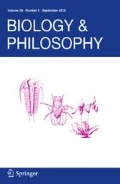Abstract
Ernst Mayr's historical writings began in 1935 with his essay “Bernard Altum and the territory theory” and have continued up through his monumentalGrowth of Biological Thought (1982) and hisOne Long Argument: Charles Darwin and the Genesis of Modern Evolutionary Thought (1991). Sweeping in their scope, forceful in their interpretation, enlisted on behalf of the clarification of modern concepts and of a broad view of biology, these writings provide both insights and challenges for the historian of biology. Mayr's general intellectual formation was guided by the GermanBildung ideal, with its emphasis on synthetic and comprehensive knowledge. His understanding of how to write history was inspired further by the example of the historian of ideas Arthur Lovejoy. Some strengths and limitations of this approach are explored here through attention to Mayr's treatment of the French biologist J.-B. Lamarck. It is contended that Mayr's contributions to the history of biology are not restricted to his own very substantial historical writings but also include his encouragement of other scholars, his development of an invaluable archive of scientific correspondence, and his insistence that historians who write about evolution and related subjects acquire an adequate understanding of the principles of Darwinian biology.
Author information
Authors and Affiliations
Additional information
This paper was originally delivered at the biennial meeting of the International Society for the History, Philosophy, and Social Studies of Biology, held in Brandeis in July 1993, in the special session organized by John Greene on Ernst Mayr's contributions to systematics, evolutionary theory, and the history and philosophy of biology. The paper is presented here with only slight modifications of the original, oral presentation. As indicated in the text, a full assessment of Mayr's historical work, including situating that work in the context of Mayr's other work and contemporary developments in the history of science, would require a much more extensive study than I have been able to undertake here.
Rights and permissions
About this article
Cite this article
Burkhardt, R.W. Ernst Mayr: Biologist-historian. Biol Philos 9, 359–371 (1994). https://doi.org/10.1007/BF00857942
Issue Date:
DOI: https://doi.org/10.1007/BF00857942

